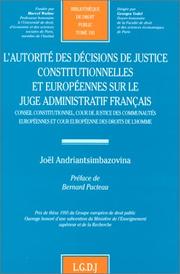| Listing 1 - 10 of 279 | << page >> |
Sort by
|
Book
Abstract | Keywords | Export | Availability | Bookmark
 Loading...
Loading...Choose an application
- Reference Manager
- EndNote
- RefWorks (Direct export to RefWorks)
Periodical
ISSN: 22767371 Publisher: [S.l.] Nnamdi Azikiwe University
Abstract | Keywords | Export | Availability | Bookmark
 Loading...
Loading...Choose an application
- Reference Manager
- EndNote
- RefWorks (Direct export to RefWorks)
Law --- Jurisprudence --- International and municipal law --- International and municipal law. --- Jurisprudence. --- Law. --- Nigeria.
Book
ISBN: 9060921917 Year: 1985 Publisher: Alphen aan den Rijn Samsom
Abstract | Keywords | Export | Availability | Bookmark
 Loading...
Loading...Choose an application
- Reference Manager
- EndNote
- RefWorks (Direct export to RefWorks)
Book
ISBN: 9076871361 Year: 2005 Publisher: Groningen Europa Law Publishing
Abstract | Keywords | Export | Availability | Bookmark
 Loading...
Loading...Choose an application
- Reference Manager
- EndNote
- RefWorks (Direct export to RefWorks)
European law --- International law --- International and municipal law --- Law
Periodical
Abstract | Keywords | Export | Availability | Bookmark
 Loading...
Loading...Choose an application
- Reference Manager
- EndNote
- RefWorks (Direct export to RefWorks)
Law --- Law. --- Periodicals. --- Municipal law. --- Yugoslavia. --- General and Others

ISBN: 019825525X Year: 1997 Publisher: Oxford Clarendon Press
Abstract | Keywords | Export | Availability | Bookmark
 Loading...
Loading...Choose an application
- Reference Manager
- EndNote
- RefWorks (Direct export to RefWorks)
Civil rights --- Europe --- International and municipal law --- Human rights
Book
ISBN: 9789041159557 904115955X Year: 2016 Volume: 95 Publisher: Alphen aan den Rijn: Wolters Kluwer, Kluwer Law International,
Abstract | Keywords | Export | Availability | Bookmark
 Loading...
Loading...Choose an application
- Reference Manager
- EndNote
- RefWorks (Direct export to RefWorks)
European private international law, as it stands in the Rome I, II, and III Regulations and the recent Succession Regulation, presents manifold risks of diverging judgments despite seemingly harmonised conflict of law rules. There is now a real danger, in light of the rapid increase in the number of legal instruments of the European Union on conflict of laws, that European private international law will become incoherent.This collection of essays by twenty noted scholars in the field sheds clear light on the pivotal issues of whether a set of overarching rules (a ‘general part’) is required, whether an EU regulation is the adequate legal instrument for such a purpose, which general questions such an instrument should address, and what solutions such an instrument should provide. In analysing the possible emergence of general principles in European private international law over the past years, the contributors discuss such issues and factors as the following:the relationship between conflict of laws and recognition;the room for party autonomy;the concept of habitual residence;adaptation when interplay between different laws leads to deadlock;public policy exceptions;the desirability of a general escape clause;the classic topics of characterisation, incidental question, and renvoi; andright to appeal in case of errors in the application of foreign law.Practitioners dealing with these notoriously difficult cases will welcome this in-depth treatment of the issues, as will interested policymakers throughout the EU Member States and at the EU level itself. Scholars will discover an incomparable comparative analysis leading to expert recommendations in European private international law, opening the way to an effective European framework in this area.

ISBN: 0521841356 0521176360 1107140234 0511171234 1281836664 9786611836665 0511082274 0511326688 051149209X 0511196938 0511081820 9780521841351 9780521176361 9780511082276 9780511081828 9780511492099 9781281836663 9786610415854 6610415854 Year: 2011 Publisher: Cambridge: Cambridge university press,
Abstract | Keywords | Export | Availability | Bookmark
 Loading...
Loading...Choose an application
- Reference Manager
- EndNote
- RefWorks (Direct export to RefWorks)
This 2005 book argues that Europeanization and globalization have led to ever-more intensive legalization at transnational level. What accounts for compliance beyond the nation-state ? The authors tackle this question by comparing compliance with regulations that have been formulated in a very similar way at different levels of governance. They test compliance with rules at the national level, at the regional level (EU), and at a global level (WTO), finding that in fact the EU has higher levels of compliance than both international and national rules. The authors argue that this is because the EU has a higher level of legalization, combined with effective monitoring mechanisms and sanctions. In this respect it seems that the European Union has indeed achieved a high level of legalization and compliance, though the authors add that this achievement does not settle the related queries with the legitimacy of transnational governance and law
International and municipal law --- Federal government --- Europe --- Economic integration --- Social Sciences --- Political Science --- International and municipal law - European Union countries --- International and municipal law - Germany --- Federal government - Germany --- Europe - Economic integration --- European Union countries --- Economic integration. --- Theory of the state

ISSN: 05200288 ISBN: 2275016309 9782275016306 Year: 1998 Volume: 192 Publisher: Paris: Librairie générale de droit et de jurisprudence,
Abstract | Keywords | Export | Availability | Bookmark
 Loading...
Loading...Choose an application
- Reference Manager
- EndNote
- RefWorks (Direct export to RefWorks)
Book
ISBN: 9780521138024 9780521199353 9781316134634 0521138027 Year: 2010 Publisher: Cambridge: Cambridge university press,
Abstract | Keywords | Export | Availability | Bookmark
 Loading...
Loading...Choose an application
- Reference Manager
- EndNote
- RefWorks (Direct export to RefWorks)
| Listing 1 - 10 of 279 | << page >> |
Sort by
|

 Search
Search Feedback
Feedback About UniCat
About UniCat  Help
Help News
News